专四真题语法分析
- 格式:docx
- 大小:501.94 KB
- 文档页数:11
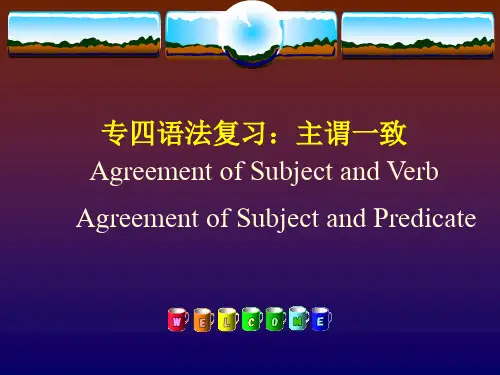
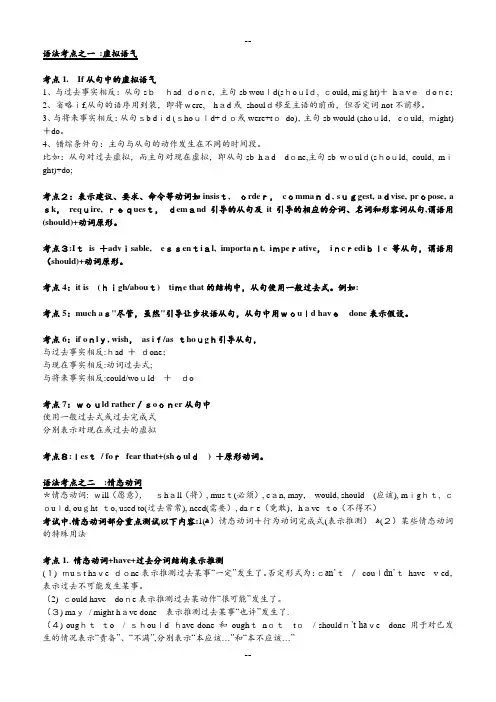
语法考点之一:虚拟语气考点1.If从句中的虚拟语气1、与过去事实相反:从句sbhad done,主句sb would(should, could, might)+havedone;2、省略if,从句的语序用到装,即将were,had或should移至主语的前面,但否定词not不前移。
3、与将来事实相反:从句sb did (should+do或were+todo),主句sb would (should,could, might)+do。
4、错综条件句:主句与从句的动作发生在不同的时间段。
比如:从句对过去虚拟,而主句对现在虚拟,即从句sb had done,主句sb would(should, could, might)+do;考点2:表示建议、要求、命令等动词如insist,order,command, suggest, advise, propose, a sk,require, request,demand引导的从句及it引导的相应的分词、名词和形容词从句,谓语用(should)+动词原形。
考点3:Itis +advisable,essential, important, imperative,incredible等从句,谓语用(should)+动词原形。
考点4:it is(high/about)time that的结构中,从句使用一般过去式。
例如:考点5:much as"尽管,虽然"引导让步状语从句,从句中用would havedone表示假设。
考点6:if only, wish,as if/as though引导从句,与过去事实相反:had +done;与现在事实相反:动词过去式;与将来事实相反:could/would+do考点7:would rather/sooner从句中使用一般过去式或过去完成式分别表示对现在或过去的虚拟考点8:lest/ forfear that+(should) +原形动词。
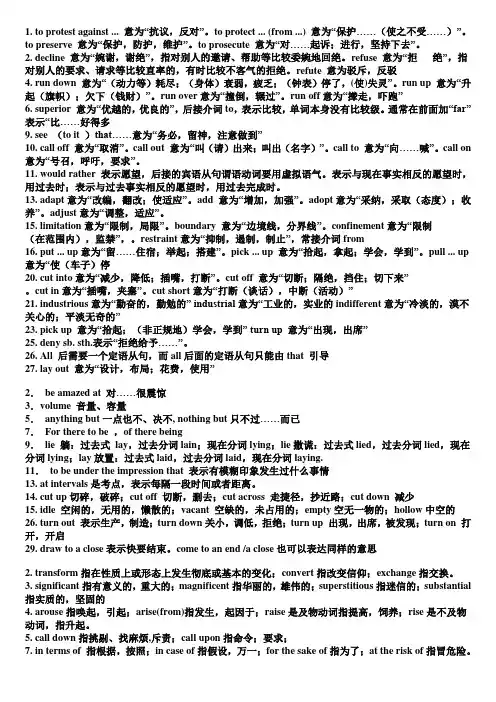
1. to protest against ... 意为“抗议,反对”。
to protect ... (from ...) 意为“保护……(使之不受……)”。
to preserve 意为“保护,防护,维护”。
to prosecute 意为“对……起诉;进行,坚持下去”。
2. decline 意为“婉谢,谢绝”,指对别人的邀请、帮助等比较委婉地回绝。
refuse 意为“拒绝”,指对别人的要求、请求等比较直率的,有时比较不客气的拒绝。
refute 意为驳斥,反驳4. run down 意为“(动力等)耗尽;(身体)衰弱,疲乏;(钟表)停了,(使)失灵”。
run up 意为“升起(旗帜);欠下(钱财)”。
run over意为“撞倒,辗过”。
run off意为“撵走,吓跑”6. superior 意为“优越的,优良的”,后接介词to,表示比较,单词本身没有比较级。
通常在前面加“far”表示“比……好得多9. see (to it )that……意为“务必,留神,注意做到”10. call off 意为“取消”。
call out 意为“叫(请)出来;叫出(名字)”。
call to 意为“向……喊”。
call on 意为“号召,呼吁,要求”。
11. would rather 表示愿望,后接的宾语从句谓语动词要用虚拟语气。
表示与现在事实相反的愿望时,用过去时;表示与过去事实相反的愿望时,用过去完成时。
13. adapt意为“改编,翻改;使适应”。
add 意为“增加,加强”。
adopt意为“采纳,采取(态度);收养”。
adjust意为“调整,适应”。
15. limitation意为“限制,局限”。
boundary 意为“边境线,分界线”。
confinement意为“限制(在范围内),监禁”,。
restraint意为“抑制,遏制,制止”,常接介词from16. put ... up意为“留……住宿;举起;搭建”。
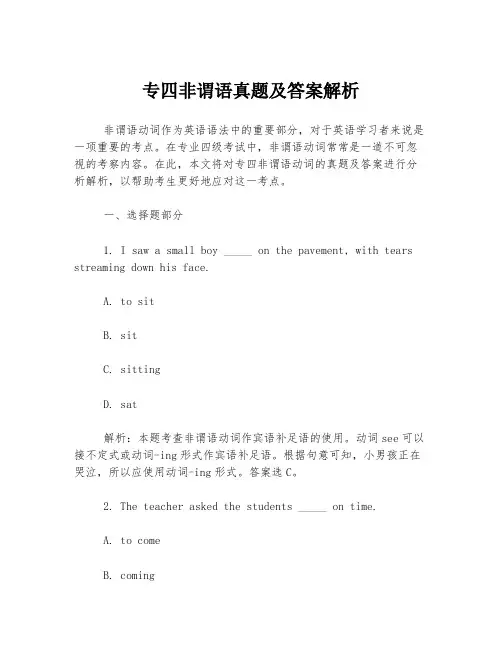
专四非谓语真题及答案解析非谓语动词作为英语语法中的重要部分,对于英语学习者来说是一项重要的考点。
在专业四级考试中,非谓语动词常常是一道不可忽视的考察内容。
在此,本文将对专四非谓语动词的真题及答案进行分析解析,以帮助考生更好地应对这一考点。
一、选择题部分1. I saw a small boy _____ on the pavement, with tears streaming down his face.A. to sitB. sitC. sittingD. sat解析:本题考查非谓语动词作宾语补足语的使用。
动词see可以接不定式或动词-ing形式作宾语补足语。
根据句意可知,小男孩正在哭泣,所以应使用动词-ing形式。
答案选C。
2. The teacher asked the students _____ on time.A. to comeB. comingC. comeD. came解析:本题考查非谓语动词作宾语补足语的使用。
动词ask可以接不定式或动词-ing形式作宾语补足语。
根据句意可知,老师要求学生按时到来,所以应使用动词不定式。
答案选A。
3. _____ the truth, she decided to tell her parents the whole story.A. KnowingB. KnownC. To knowD. Know解析:本题考查非谓语动词作状语的使用。
动词know可以接不定式、动词-ing形式或宾语从句作状语。
根据句意可知,她决定告诉父母整个故事,是因为她知道真相,所以应使用动词-ing形式。
答案选A。
二、改错题部分1. They watched the movie, that left them deeply moved.解析:本题考查非谓语动词作定语的使用。
定语从句中的关系代词that在此处不合适,应改为which。
另外,非谓语动词作定语时,应使用现在分词形式。
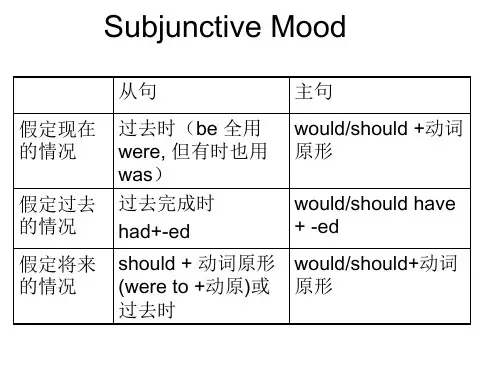
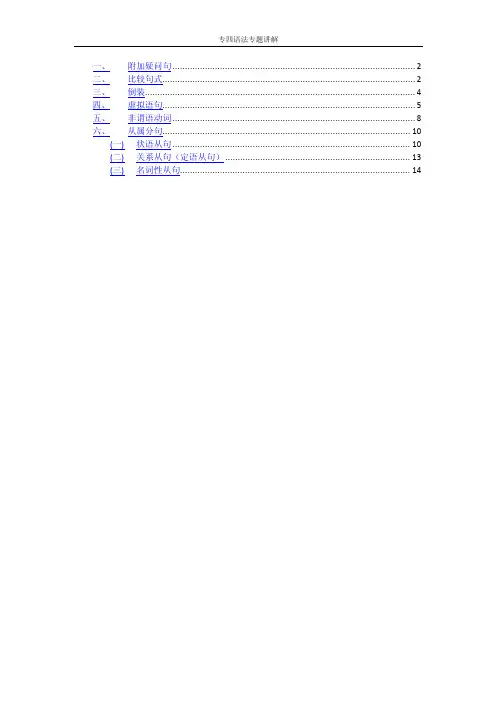
一、附加疑问句 (2)二、比较句式 (2)三、倒装 (4)四、虚拟语句 (5)五、非谓语动词 (8)六、从属分句 (10)(一)状语从句 (10)(二)关系从句(定语从句) (13)(三)名词性从句 (14)一、附加疑问句附加疑问句由两部分组成,前面是一个陈述句,后面是一个简短问句,下面分析几种特殊的附加疑问句形式:1. 如果陈述部分是祈使句,附加疑问句部分一般使用will you, w on’t you例如:Pass me some salt, won’t you?递给我一些盐,好吗?2. 如果陈述部分的主语是this, that, these, those时,附加疑问句部分的主语为it或they例如:This is exciting, isn’t it?这很令人兴奋,不是吗?3. 如果陈述部分是一个复合句,则分两种情况:1) 一般情况下,附加疑问句部分的主语应与陈述部分的主语保持一致,例如:Mary said her son would come, didn’t she? 玛丽说她的儿子要来,不是吗?2) 但如果陈述部分的主语是第一人称,且谓语动词是suppose, think, believe等,附加疑问句的主语则应该与从句的主语保持一致,例如:I think he will come, won’t he?我认为他会来,不是吗?4. 如果陈述部分是there be存在句,附加疑问句部分的主语也应该用there例如:There are some books, aren’t there?有一些书,不是吗?5. 如果陈述部分中带有否定词或半否定词,如never,hardly,scarcely,seldom,no,none,no one,rarely,nowhere,nothing,nobody,few,little等,附加疑问句的谓语要用肯定形式例如:There are rarely extremes of cold or heat in Britain, are there?英国很少出现严寒或酷暑天气,是吗?二、比较句式1. 形容词、副词比较级和最高级的用法1) 比较级修饰语(a) 比较级之前的副词修饰语常用many, much, far, a little, a bit, slightly, a great deal, a lot, somewhat, rather, etc.。
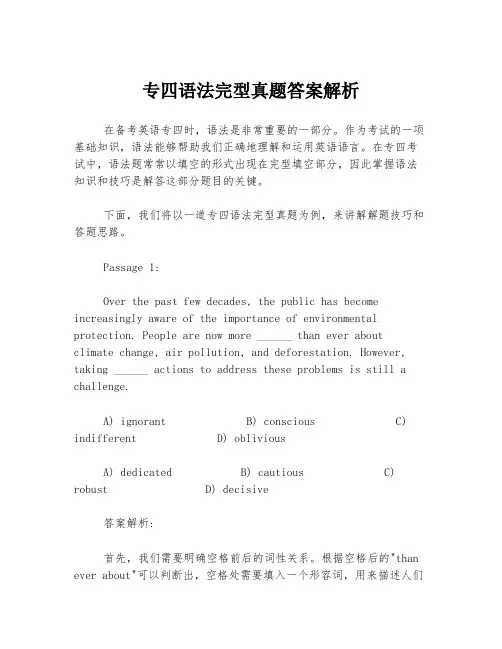
专四语法完型真题答案解析在备考英语专四时,语法是非常重要的一部分。
作为考试的一项基础知识,语法能够帮助我们正确地理解和运用英语语言。
在专四考试中,语法题常常以填空的形式出现在完型填空部分,因此掌握语法知识和技巧是解答这部分题目的关键。
下面,我们将以一道专四语法完型真题为例,来讲解解题技巧和答题思路。
Passage 1:Over the past few decades, the public has become increasingly aware of the importance of environmental protection. People are now more ______ than ever about climate change, air pollution, and deforestation. However, taking ______ actions to address these problems is still a challenge.A) ignorant B) conscious C) indifferent D) obliviousA) dedicated B) cautious C) robust D) decisive答案解析:首先,我们需要明确空格前后的词性关系。
根据空格后的"than ever about"可以判断出,空格处需要填入一个形容词,用来描述人们的状态。
接着,我们来看空格前的词。
在这个句子中,空格前的词是"are now more",表达了人们的状态的变化。
通过对选项进行分析,我们可以排除C) indifferent和D) oblivious,因为这两个词分别表示冷漠和无视,与人们更加关注环境保护的背景相矛盾。
剩下的选项是A) ignorant和B) conscious。
接下来,我们需要根据句子的语境和逻辑来判断正确答案。
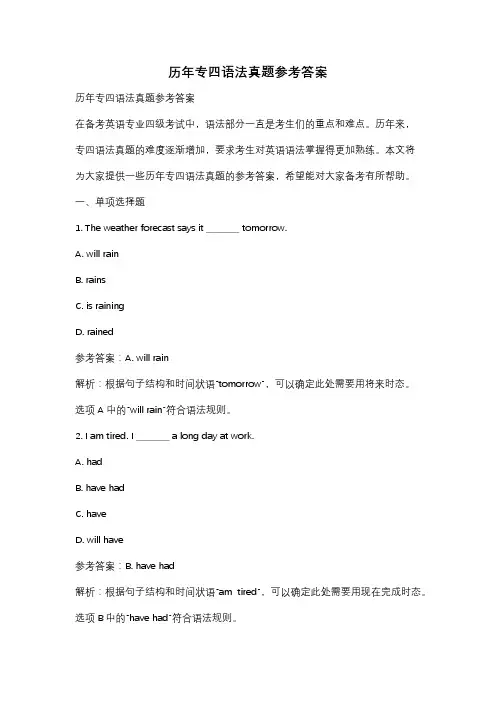
历年专四语法真题参考答案历年专四语法真题参考答案在备考英语专业四级考试中,语法部分一直是考生们的重点和难点。
历年来,专四语法真题的难度逐渐增加,要求考生对英语语法掌握得更加熟练。
本文将为大家提供一些历年专四语法真题的参考答案,希望能对大家备考有所帮助。
一、单项选择题1. The weather forecast says it ________ tomorrow.A. will rainB. rainsC. is rainingD. rained参考答案:A. will rain解析:根据句子结构和时间状语“tomorrow”,可以确定此处需要用将来时态。
选项A中的“will rain”符合语法规则。
2. I am tired. I ________ a long day at work.A. hadB. have hadC. haveD. will have参考答案:B. have had解析:根据句子结构和时间状语“am tired”,可以确定此处需要用现在完成时态。
选项B中的“have had”符合语法规则。
3. ________ you have any questions, please feel free to ask.A. WouldB. ShouldC. CouldD. If参考答案:D. If解析:根据句子结构和语境,此处需要用虚拟语气来表示“如果”。
选项D中的“If”符合语法规则。
二、改错题1. I didn't seen him for a long time.改为:I haven't seen him for a long time.参考答案:haven't解析:根据句子结构和时间状语“for a long time”,可以确定此处需要用现在完成时态。
选项haven't符合语法规则。
2. She is very good at play the piano.改为:She is very good at playing the piano.参考答案:playing解析:根据句子结构和动词“play”的用法,可以确定此处需要用动名词形式。
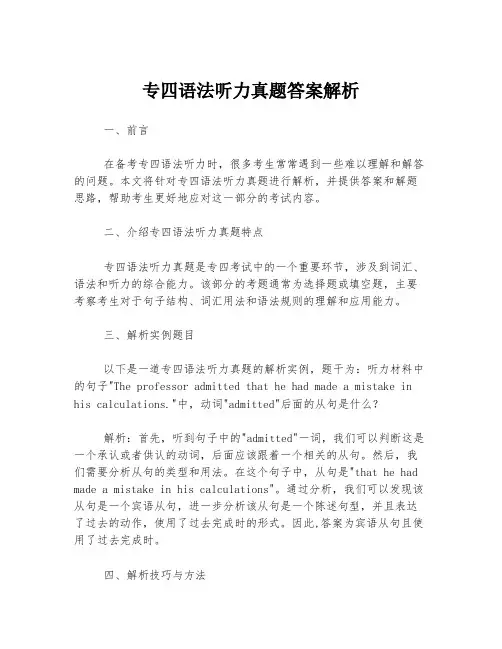
专四语法听力真题答案解析一、前言在备考专四语法听力时,很多考生常常遇到一些难以理解和解答的问题。
本文将针对专四语法听力真题进行解析,并提供答案和解题思路,帮助考生更好地应对这一部分的考试内容。
二、介绍专四语法听力真题特点专四语法听力真题是专四考试中的一个重要环节,涉及到词汇、语法和听力的综合能力。
该部分的考题通常为选择题或填空题,主要考察考生对于句子结构、词汇用法和语法规则的理解和应用能力。
三、解析实例题目以下是一道专四语法听力真题的解析实例,题干为:听力材料中的句子"The professor admitted that he had made a mistake in his calculations."中,动词"admitted"后面的从句是什么?解析:首先,听到句子中的"admitted"一词,我们可以判断这是一个承认或者供认的动词,后面应该跟着一个相关的从句。
然后,我们需要分析从句的类型和用法。
在这个句子中,从句是"that he had made a mistake in his calculations"。
通过分析,我们可以发现该从句是一个宾语从句,进一步分析该从句是一个陈述句型,并且表达了过去的动作,使用了过去完成时的形式。
因此,答案为宾语从句且使用了过去完成时。
四、解析技巧与方法1. 注意动词的搭配和语法使用。
有些动词后面必须要跟特定的词、词组或者句型,例如"admit to","insist on","apologize for"等等。
因此,在听力中碰到这类动词时需要特别注意。
2. 熟悉常见的语法结构和句型。
掌握常见的语法结构和句型可以帮助我们更好地理解听力材料中的句子,可以从中找出所需的答案。
例如,宾语从句、时间状语从句、条件状语从句等。
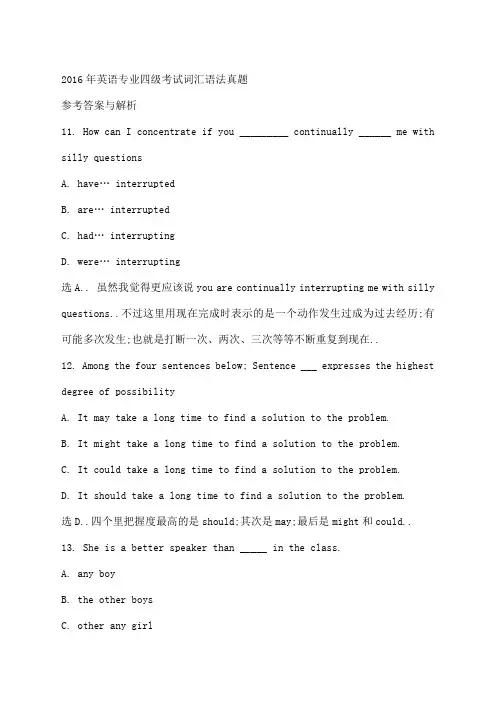
2016年英语专业四级考试词汇语法真题参考答案与解析11. How can I concentrate if you _________ continually ______ me with silly questionsA. have… interruptedB. are… interruptedC. had… interruptingD. were… interrupting选A.. 虽然我觉得更应该说you are continually interrupting me with silly questions..不过这里用现在完成时表示的是一个动作发生过成为过去经历;有可能多次发生;也就是打断一次、两次、三次等等不断重复到现在..12. Among the four sentences below; Sentence ___ expresses the highest degree of possibilityA. It may take a long time to find a solution to the problem.B. It might take a long time to find a solution to the problem.C. It could take a long time to find a solution to the problem.D. It should take a long time to find a solution to the problem.选D..四个里把握度最高的是should;其次是may;最后是might和could..13. She is a better speaker than _____ in the class.A. any boyB. the other boysC. other any girlD. all the girls选A.. 主语是she;女的;所以不能选B..C的正确说法是any other girl..14. Nobody heard him sing; ______A. did oneB. did heC. didn’t theyD. did they选B..根据专四语法出题依据的书新编英语语法教程章振邦317页;nobody这种附加疑问句;书面语里用he..口语里偶见they..实际上;现代英语里为了避免有语言歧视为什么只有he;没有she;很多人都避免只用he;而多改为they..15. I can’t put up with ________.A. that friend of youB. that friend of yoursC. the friend of youD. the friend of yours选B..根据专四语法出题依据的书新编英语语法教程章振邦57-58页;这种双重属格结构所修饰的名词可带a; any; some等表示非确定特指的限定词;但通常不带定冠词..比如a daughter of Mrs. Green’s; any/some daughters of Mrs/ Green’s..16. There has been an increasing number of _______ in primary schools in the past few years.A. man teacherB. men teacherC. man teachersD. men teachers选D..合成名词复数;man/woman这种;两种都要变成复数;比如women drivers..17. This is one of the issues that deserve _____.A. being mentionedB. mentioningC. to mentionD. for mention选 B..deserve后面接动名词表示被动含义..要么就说deserve to be mentioned..18. The audience ______ excited on seeing _______ favorite star glide onto the stage.A. were…theirB. were…itsC. was…theirD. was…one’s选A..虽然audience这个集合名词和class; team等一样属于可单可复;但用代词回指时要保持数的一致性..所以 C错了;要用its..19. ________ your advice; I would have made the wrong decision.A. Hadn’t it bee n forB. Had it not been forC. Had it been forD. Had not it been for选B..条件虚拟句if省略后;had、were、should要到句首倒装..20. The sentence “I wish I had been more careful in spending money”expresses the speaker’s ______.A. hopeB. joyC. regretD. relief选C.. wish这里引导的是虚拟句;我当时花钱应该更小心点..21. The Attorney General ordered a federal autopsy of Brown’s body; seeking to ___ the family and community there would be a thorough investigation into his death.A. ensureB. insureC. assureD. ascertain选C..assure somebody that/ assure somebody of something指to tell someone that something will definitely happen or is definitely true so that they are less worried;也可以用reassure..Ensure是make sure的意思;后面不能接somebody..Ascertain是find out22. The police department came under strong criticism for both the death of an unarmed man and its handling of the ____.A. consequenceB. outcomeC. resultD. aftermath23. The Foreign Secretary tried to ______ doubts about his handling of the crisis.A. dispelB. expelC. repelD. quell选 A..dispel指to remove fears; doubts; and false ideas; usually byproving them wrong or unnecessary..Expel比喻义指to force someone to leave a school; organization; or country..Repel指People or things that repel you make you feel strongly that you do not want to be near; see; or think about them..Quell一般指to end a situation in which people are behaving violently or protesting; especially by using force..但是朗文当代英语词典、柯林斯、剑桥高阶等字典里收录或者列出了quell panic/fear/doubts..出题者这里不够严谨..24. Mutual funds are thus best f or investors who don’t want to take the time to study stocks in detail or who _______ the resources to build a portfolio.A. depriveB. lackC. yearnD. attain选B..mutual funds指互惠基金;portfolio指证券投资组合;均为常见金融术语..25. Chris ran ______ John at a sporting-goods trade show and the two quickly struck _____ an easy rapport.A. into…upB. on…intoC. across…onD. against…into选A.. run into somebody指to meet someone you know when you are not expecting to..这里的strike up指start a relationship or conversation with someone..Rapport源自法语;请自行查字典注意发音..指friendly agreement and understanding between people..26. “I’m leaving the country soon;” he told a _______ convened group of reporters.A. especiallyB. particularlyC. speciallyD. specifically选C..convene指if a group of people convene; or someone convenes them; they come together; especially for a formal meeting..27. Israel and Hamas had reached a deal on extending the ______ ceasefire by an extra 24 hours until Tuesday at midnight.A. contemporaryB. makeshiftC. spontaneousD. temporary28. _____ to unplugging the alarm clock and trusting your ability to wake on time on your own; you should probably ease yourself into the new arrangement by keeping a very regular schedule for several weeks.A. DueB. PriorC. RelatedD. Thanks29. If you are an athlete; strong abdominal muscles help you ensure a strong back and freedom from injury during ______ upper-body movement.A. valiantB. variableC. vigilantD. vigorous30. Finning is a cru el _______ in which the shark’s fins are lopped off; and the live shark is thrown back to sea.A. realityB. truthC. practiceD. skill作者:@少数派memetics转载请注明说明:非官方版;是@少数派memetics自己查找资料综合得来;仅供参考..。
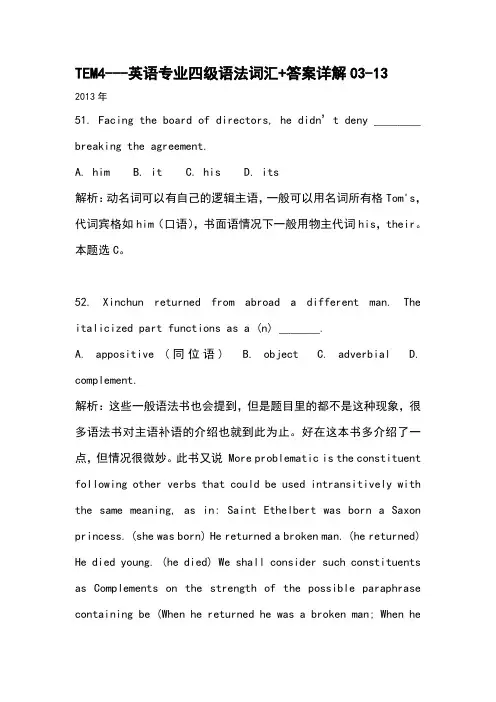
TEM4---英语专业四级语法词汇+答案详解03-132013年51. Facing the board of directors, he didn’t deny ________ breaking the agreement.A. himB. itC. hisD. its解析:动名词可以有自己的逻辑主语,一般可以用名词所有格Tom's,代词宾格如him(口语),书面语情况下一般用物主代词his,their。
本题选C。
52. Xinchun returned from abroad a different man. The italicized part functions as a (n) _______.A. appositive (同位语)B. objectC. adverbialD. complement.解析:这些一般语法书也会提到,但是题目里的都不是这种现象,很多语法书对主语补语的介绍也就到此为止。
好在这本书多介绍了一点,但情况很微妙。
此书又说 More problematic is the constituent following other verbs that could be used intransitively with the same meaning, as in: Saint Ethelbert was born a Saxon princess. (she was born) He returned a broken man. (he returned) He died young. (he died) We shall consider such constituents as Complements on the strength of the possible paraphrase containing be (When he returned he was a broken man; When hedied he was young). 这部分恰好就是本题所代表的类型,但是从该书作者表述来看,他们也承认这样的句子很不一般,不太容易轻易判定是否为主语补语,在本书里,作者认为可以看作是主语补语,因为大概可以改写成含有系动词be的句子,但作者的措辞显然没有那么肯定,有待商榷的意思。
英语专业四级词汇语法练习及答案解析英语专业四级词汇语法练习及答案解析书到用时方恨少,事非经过不知难。
以下是店铺为大家搜索整理的英语专业四级词汇语法练习及答案解析,希望能给大家带来帮助!1. If you____ that late movie last night, you wouldn’t be sleepy.A. haven’t watchedB. didn’t watchedC. hadn’t watchedD. wouldn’t have watched2. Anna refused to____the car keys to her husband until he had promised to wear his safety belt.A. hand inB. hand outC. hand downD. hand over3. “He is already on the wrong side of forties.”“It’s about time he ____himself a wife and settled down.”A. findsB. should findC. foundD. had found4. We find the book quite____: it provides us with an abundance of information on western music.A. distractingB. enlighteningC. amusingD. confusing5. It is necessary that an efficient worker____his work on time.A. accomplishesB. can accomplishC. accomplishD. has accomplished6. Dogs are often praised for their____; they almost never abandon their masters.A. truthfulnessB. loyaltyC. trustD. faith7. “How did James Bond escape from the locked confine?”“Oh, you know he always manages ____a tight situation.”A. to get out ofB. getting out ofC. to have got him out ofD. in getting out of8. The scientific group is carrying out a research focused ona drug which is so____as to be able to change brain chemistry.A. powerfulB. influentialC. monstrousD. vigorous9. The boss of the company has always attended to the ____of important business himself.A. transactionB. stimulationC. transitionD. solution10. He ordered the work ____.A. started at onceB. to be started at onceC. to start at onceD. at once start参考答案:1. 答案 C【参考译文】如果你昨晚不看那么晚的电影,你现在也不会那么困倦了。
试题答案与解析1. D) 【句意】虽然白色过去不受欢迎,但目前它是婚纱的首选颜色。
【难点】as是连词,引导让步状语从句时,往往使用半倒装形式。
又如:Beautiful as she is, she is foolish.2. C) 【句意】由于长时间无雨,田野变得十分干燥。
【难点】该句的前半部分是There be结构,完成式独立结构形式,这与时间状语for a long time相吻合。
3. A) 【句意】数百万次计算如果用手工操作,那么,到计算结束的时候,就将失去其全部实际意义。
【难点】这是一句虚拟语气的句子,条件句使用了省略if的倒装句形式,动作与过去事实相反。
4. B) 【句意】电视使我们能够在事情发生的那一瞬间就看到它们是如何发生的。
【难点】moment后接的是省略关系副词when的定语从句。
B)符合题意要求。
5. D) 【句意】最令我惊讶的是,这个在车祸中失去双臂的小男孩能够用脚使用钢笔。
【难点】这是一个what从句作主语的典型句子。
6. A) 【句意】虽然她很小的时候就写了很多短篇小说和诗歌,但她直到25岁才迎来第一次真正的成功。
【难点】这是一个练习not until结构的句子。
7. A) 【句意】你应该知道,不该把你小妹妹一个人留在家里。
【难点】to know better than to do sth.是一个常见的表示责备的句型,意为“应该知道不该做某事”。
8. C) 【句意】既然火车一个小时以后才开,我们不妨到快餐店吃口东西。
【难点】might as well后接动词原形,意为“不妨,何不”。
9. D) 【句意】当她没钱为孩子买吃的东西时,她开始偷。
【难点】resort to意为:求助于,其中to是介词,后接动名词。
10. A) 【句意】那个男孩承认在昨天踢足球的时候打破了窗子。
【难点】admit to中的to是介词,后接名词或动名词。
11. D) 【句意】贝蒂建议我把我们的行李认真地贴上标签以免运输中放错位置。
反义疑问句. 前肯后否,前否后肯 陈述句+附加疑问句 一疑问部分的主语 1. 当陈述句部分的主语是everything, something, nothing 等指物的合成词是,疑问句主语用it. Everything is arranged in a good order, isn’t it?
1-1 当陈述句主语部分是everyone, everybody, somebody, nobody, no one 等指人的合成词的时候,疑问句主语在正式语体中用he, 非正式语体中用 they Someone has broken the glass, isn’t he? No one knows the history of this Museum, do they?
2. 当陈述部分是there be 句式, 附加疑问句的主语也用there. There’s something wrong, isn’t there? There used to be a petrol station near the park, ______? Answer: didn’t there?/ usedn’t there? ----当陈述句部分的谓语是used to时, 疑问句部分用didn’t +主语或者usedn’t +主语
3.当陈述部分的主语是不定式,动名词,从句或this /that 时,疑问句部分的主语通常用it. Seeing is believing, isn’t it? This is not as beautiful as that, isn’t it?
4.当陈述部分的主语是时不定代词one时,疑问句部分的主语可以用one(正式)或者you(非正式) One can not survive without water, can you/one?
5.-1当陈述句部分是主从复合句,附加疑问句部分一般与主句的主语和谓语动词一致。 If you had come yesterday, you might have seen him, mightn’t you? 5-2但,当陈述部分的主句是第一人称+think, believe, suppose, suspect, except等结构是,附加疑问句往往与宾语从句中的主语和谓语保持对应关系,但是要注意否定的转移,I don’t think he will arrive here in time, will he? 5-3而该主语为非第一人称时,附加疑问句应与主句一致.(和5-1差不多) They don’t believe she’s an engineer, do they?
二 特殊反意疑问句 1. 祈使句中的附加问句。 1-1 “祈使句+附加疑问句”构成的附加疑问句中,疑问句一般用will you, won’t you, would you; 否定的祈使句之后的附加疑问句只可用will you. Sit down, won’t you? Be quiet, would you? Don’t move the CD, will you? When you have finished with that video tape, don’t forget to put it in my drawer, will you? 1-2 在以Let’s开头的祈使句之后,附加疑问句用shall we. Let’s go shopping, shall we?
2.当陈述部分含有以下含有否定意义的词: few little seldom hardly rarely never not no no one nobody nothing none neither, 疑问句需要用肯定结构 Few people know him, do they? He seldom gives his wife a present, hasn’t/doesn’t he? 3.当陈述句部分带有“有”含义的动词have/has/had, 附加疑问句部分既可以用have/ has/had, 也可以用do/ does/did, 如果含义不是有,则必须用do/does/did. You had breakfast, didn’t you? He has a good memory, hasn’t /doesn’t he?
4.当陈述部分是I am 结构,疑问句部分在正式场合用am I not, 非正式口语中用aren’t I. I’m lat, am I not/ aren’t I?
5.陈述部分是I wish 句式,表示询问或者征求意见时,疑问句部分用May I? I wish to shake hand with you, may I?
6. 陈述句部分含有情态动词时,附加疑问句部分助动词的选择: 陈述句部分含有ought to, 附加疑问句部分用ought 或should. We ought to go there, oughtn’t /shouldn’t we? 陈述句部分含有Used to 附加疑问句部分用used 或did He used to smoke forty cigarettes a day, usedn’t/didn’t he? 陈述句部分含有Need/dare附加疑问句部分用need/dare. 当dare/ need为实义动词时,疑问部分用do/does/did/. He dare not say so, dare he? She doesn’t dare to go home alone, dose he? 陈述句部分含有must 时附加疑问句部分通常用must, 但如must作“有必要”解释时,也可以用needn’t, 表示一定,肯定推测意义时, 也可以根据上下文用其他动词 He must have waited here for a long time, hasn’t he? You must have to got up late this morning, didn’t you?
倒装(Inversion)与省略 1 完全倒装。 将整个谓语动词或者整个谓语部分都放在主语前面时,称为完全倒装。使用完全倒装的情况有: (1) 以here, there, now, then, from, out, in , down, up, away, on等副词开头的句子,且谓语动词都属于表示移动的含义,主语为名词时,如: There followed a long silence. Now come the long-waited guests. From the distance came occasional shots. Out rushed a tiger. 注意:如果上述情况中主语为代词,则句子不必倒装。如 Out he rushed. Here he came.
(2) 地点状语置于句首,且主语为名词时。此类居中的谓语动词大多都是表示走动或者状态的不及物动词,go, come, stand, sit, lie等 Under the tree sat an old wrinkled man. At the door stood a girl about the same height as mine
(3) 表语放在句首以加强语气时,主语要放在be动词后面形成完全倒装。 Below is the blue ocean.
(4) 有时为了强调,可将谓语部分的现在分词,过去分词或不定式置于句首,从而构成倒装。 Standing t the door is a charming girl. To be carefully considered are the following questions. 2 部分倒装 指将助动词置于主语前,谓语其余部分置于主语后是部分倒装。下列情况使用部分倒装: (1)否定词及含有否定意义的副词或者词组置于句首时hardly, scarcely, rarely, little, seldom, nowhere, no sooner…than, hardly/ barely/scarcely… when, not until…, at no time决不, by no means, on no account,决不 in no way, in no case, on no condition, in/under no circumstances等. ---no sooner…than…/ hardly…when引导时间状语从句,主句用过去完成时,"than"后面的从句用一般过去时. In no way am I responsible for what has happened. No sooner had the bell rung than the students rushed out of the classroom.
(2)以Only修饰状语开头的句子,要部分倒装。 Only last week did they get married. Only if I get a job will I have enough money to get the camera. Only if both sides accept the agreement will a lasting peace to be established in this region. 注意:only属于主语的一部分时,不可用倒装结构。 Only a few people understood his point.
(3)以下列副词或者短语开头的句子,句子要部分倒装: so, such, to such a degree, to such an extent, to such extremes, to such a point. Such was the weather that I could not go out. To such a degree did the story touch me that I took notes of it.
(4)句首为so, nor, neither等副词,表明前句说明的情况也适用于该句,句子通常要部分倒装。 He didn’t say anything. No/Neither did his assistant. People in Britain rest two days a week. So do Chinese. 注意当so放在句首只是对对方所述的内容表示肯定时,不用倒装 Tom wants to complete the important. So he does.